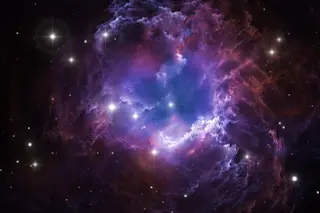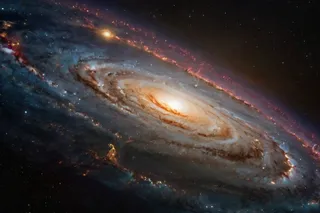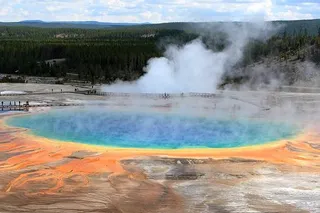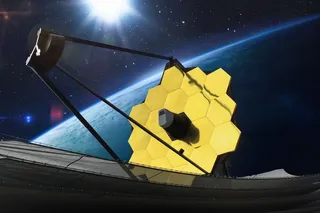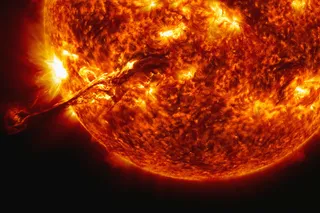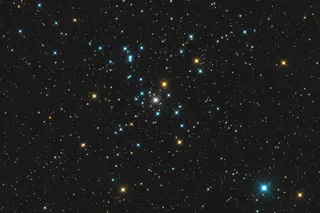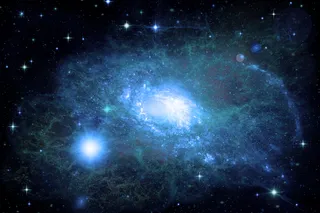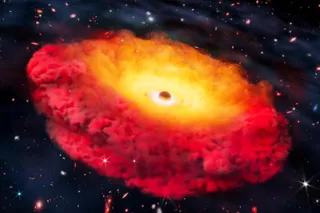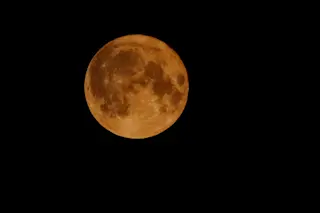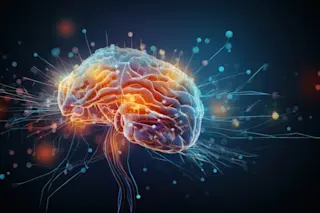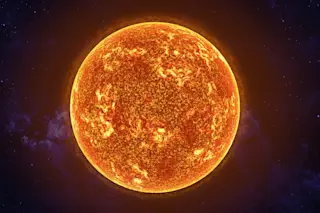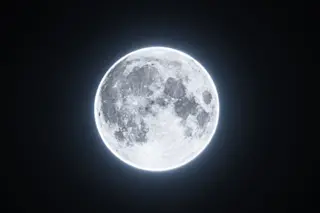It’s safe to say that our existence wouldn't be possible without molecules. Even beyond all the matter on Earth, molecules are what shaped the Universe into what it is today. But what was the first molecule to lay the foundation?
It all started with a helium hydride ion (HeH+), which researchers investigated in a new study published in Astronomy & Astrophysics. This molecule — a combination of ionized hydrogen and neutral helium atoms — was likely a catalyst for the creation of the first stars.
Now, researchers have recreated the type of reactions that caused molecular hydrogen to emerge from HeH+, gaining insight into the early chemistry that brought momentous change to the universe.
The Universe's First Molecule
When the Universe was born from the Big Bang, there were no stars, planets, or galaxies at first. But it wasn’t exactly empty. Just as outrageously high temperatures had begun to simmer down in the aftermath of the Big Bang, light elements appeared (mostly hydrogen and smaller amounts of helium).
But these elements remained ionized for 380,000 years. A cloud of free electrons not bound to any atoms also existed during this time, making the Universe opaque. Eventually, though, the universe had cooled enough for the ionized hydrogen and helium atoms to attract the electrons, resulting in the first neutral atoms.
This led to the first-ever chemical reaction, resulting in HeH+. It wasn’t until several hundred million years later that stars began to form, a process in which HeH+ and molecular hydrogen (H2) were a crucial part. The HeH+ ion, in particular, is an effective coolant. Since star formation needs to start with clumps of very cold gas and dust, this makes HeH+ a perfect ingredient.
During this process, collisions with free hydrogen atoms cause HeH+ to degrade into a neutral helium ion and an H2+ ion. These products then react with another hydrogen atom to form molecular hydrogen.
Read More: What Is Space-Time? Einstein's Theory of Time and Gravity Explained
Recreating the Earliest Chemical Reactions
For the new study, researchers tested this kind of reaction under conditions similar to those during the early Universe. This experiment involved HeH+ interacting with deuterium, which is an isotope of hydrogen containing an additional neutron in the atomic nucleus along with a proton.
In this instance, the reaction created a neutral helium atom and an HD+ ion instead of a H2+ ion. The researchers carried out this test at the Cryogenic Storage Ring at the Max Planck Institute for Nuclear Physics (MPIK) in Heidelberg, Germany, where molecular and atomic reactions can be conducted in space-like conditions.
The researchers stored the HeH+ ions for up to 60 seconds at a few kelvins (-267 °C), during which a beam of neutral deuterium ions interacted with the ions. The relative speeds of the two particle beams were adjusted to observe how the collision rate changes based on collision energy, which is directly related to temperature.
The researchers found that the rate at which the reaction occurs doesn’t slow down as temperature decreases, but instead remains constant.
“Previous theories predicted a significant decrease in the reaction probability at low temperatures, but we were unable to verify this in either the experiment or new theoretical calculations by our colleagues,” said Holger Kreckel from the MPIK, in a statement. “The reactions of HeH+ with neutral hydrogen and deuterium therefore appear to have been far more important for chemistry in the early Universe than previously assumed.”
Helium Hydride in the Modern Universe
The new study indicates that HeH+ and molecular hydrogen were essential components of star formation. But what happened to the first HeH+ molecule that set things in motion billions of years ago? Not only is that molecule long gone, but helium hydride molecules aren’t nearly as present in the modern Universe.
It wasn’t until 2019 that scientists directly observed helium hydride for the first time using the Stratospheric Observatory for Infrared Astronomy (SOFIA). It was found around 3,000 light years away in a planetary nebula called NGC 7027, where ultraviolet radiation and high temperatures from a nearby aging star create suitable conditions for the HeH+ to form.
Read More: Stars Are Born and Die Every Day — Here’s How They Evolve in Space
Article Sources
Our writers at Discovermagazine.com use peer-reviewed studies and high-quality sources for our articles, and our editors review for scientific accuracy and editorial standards. Review the sources used below for this article:
Astronomy & Astrophysics. Experimental confirmation of barrierless reactions between HeH+ and deuterium atoms suggests a lower abundance of the first molecules at very high redshifts
NASA. Early Universe
Max Planck Institute for Nuclear Physics. Chemistry at the Beginning: How Molecular Reactions Influenced the Formation of the First Stars
Universities Space Research Association. The Universe's First Molecule is found at Last



